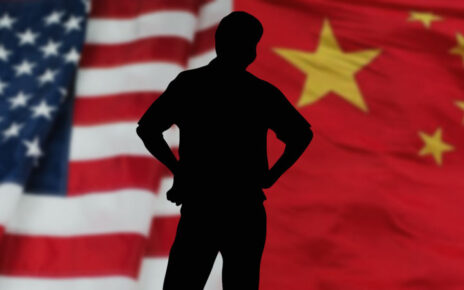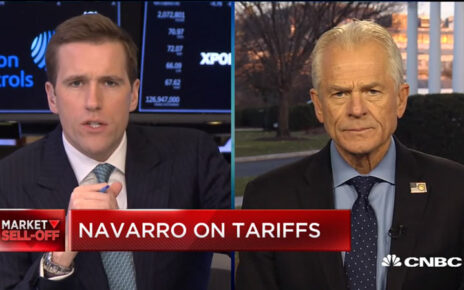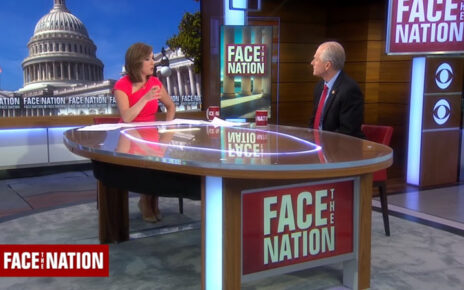August 18, 2019 – CNN State of the Union
TRANSCRIPT
Joining me now to discuss this and much more, White House trade adviser Peter Navarro.
Thanks so much for being here. I know you got a little summer cold…
NAVARRO: Good to be here, Jake.
TAPPER: … summer cold, so we appreciate your taking the time, getting up early on a Sunday.
So let me start with the economy, obviously, the basic state of the economy. In addition to the inverted yield curve, which has happened before every recession in the last half-century, I know it has now since flattened, but it did exist there for a little bit on Wednesday.
Nine major countries are either in recession or on the brink of one, perhaps even a bigger concern than the inverted yield curve. Other than pushing the Fed to lower interest rates, what is the administration doing to stave off any potential recession from coming here?
NAVARRO: So let’s clear up this inverted yield curve thing.
I didn’t write the book on it, but I have written several books about the yield curve as a leading economic indicator. Technically, we did not have a yield curve inversion.
An inverted yield curve requires a big spread between the short and the long. What we had is a…
TAPPER: As opposed to a smaller one.
NAVARRO: Correct.
All we have had is a flat yield curve.
(CROSSTALK)
TAPPER: Well, it was inverted for a little bit.
NAVARRO: No, that’s not technically an inversion. It’s a flat curve, which is a very weak signal of any possibility.
And, in this case, in this case, the flat curve is actually the result of a very strong Trump economy. What we see now is foreign capital coming to the best game on the globe, which is the Trump economy. It’s going into our stock market.
But when it goes into the bond market on the long end, it bids up bond prices and bids down yields, and you get the flat curve. The best thing we need to do now — and I think this is part of the bullish scenario I have — the Federal Reserve is going to embark on a — very aggressive interest rate cuts through the end of the year.
That will lower the short end. But, more importantly, it’ll stop suppressing our investment directly and suppressing our exports indirectly.
TAPPER: What do you mean by — let me ask you, what do you mean by suppressing? Because there’s plenty — as you know, there is lots of liquidity, there’s lots of money out there, $15 trillion being borrowed from Germany…
NAVARRO: Sure.
TAPPER: … from other countries in Europe, from Japan, where the interest rate is negative or zero percent.
And what I’m hearing from experts is, the issue as to why this money is not being invested is because of instability, because of the trade war with China, and because of political instability in the U.S.
NAVARRO: So — so, here’s what we know.
Let’s go look at the Q2 numbers. We came in at 2.1 percent. When the Fed started raising rates, it raised it over 100 — 100 basis points. Broad consensus, too far, too fast.
At the same time it was doing that, the dollar went up by almost 10 percent. So, when you look at the Q2 data, 2.1 percent, we should have came in at 3. We lost two-thirds of a point simply on exports alone, due to the indirect currency effect.
[09:05:05]
And we lost some in commercial real estate because of the uncertainty over what the Fed policy was going to do. And we had an inventory drawdown, which will bounce back.
The point is…
TAPPER: You don’t think the trade war has anything to do with this? When Jerome… NAVARRO: No, I…
(CROSSTALK)
TAPPER: Let me just say, the Fed chair, when he lowered interest rates recently, said it was because of — quote — “trade tensions, which do seem to be having a significant effect on the economy.”
You don’t…
NAVARRO: So — so, two…
TAPPER: You’re not acknowledging that the trade war has anything to do with this?
NAVARRO: So, the Federal Reserve chairman should look in the mirror and say, I raised rates too far, too fast, and I cost this economy a full percentage point of growth.
And, interestingly, earlier this week, I was on television just before James Bullard, who’s on the Board of Governors. And he basically is my best witnesses to why we’re going to have a very good economy. He said that the economy was strong. He also committed to interest rate reductions, because — not because we have a weak economy, but because we can grow faster without generating inflation.
That’s the key thing here. What Jay Powell did not understand is that the Trump economy can grow 3 percent without generating inflation. And that’s what we should be doing.
We also need help not just from the Fed. We need help from Congress right now. The other thing that needs to fall into place for really solid…
TAPPER: Is the trade deal, the USMCA.
NAVARRO: U.S., Mexico, Canada agreement.
TAPPER: But…
NAVARRO: And let me just say…
TAPPER: Yes.
NAVARRO: … that’s — that’s at least a point of growth, several hundred thousand new jobs, 75,000 in the auto sector.
And we think, by early October, if Congress can rise above partisan politics, past that, we will have Federal Reserve rate cuts.
And the last thing is…
TAPPER: Yes.
NAVARRO: … that’s going to be really important, the European Central Bank has committed now to very aggressive monetary easing that they’re going to begin in September, cutting rates, quantitative easing.
Why does that matter for us? That will lift Europe. They will buy more of our exports. And that will help everything. So I see…
(CROSSTALK)
TAPPER: But you’re really not acknowledging at all that the trade deal, that the trade wars and the tariffs have anything to do with this?
NAVARRO: That’s correct. That’s correct.
TAPPER: You don’t?
NAVARRO: The tariffs — the tariffs are — are hurting China.
China’s bearing the entire burden of the tariffs in terms of concern…
TAPPER: That’s not…
NAVARRO: Hang on.
TAPPER: … what a lot of experts say.
NAVARRO: This is what this expert says.
What we see here, unequivocally, is that China is bearing the burden by lowering their prices.
TAPPER: Right.
NAVARRO: They lowered the value of the yuan by 12 percent…
TAPPER: Right.
NAVARRO: … to offset the tariffs.
And here’s the — here’s the most important part of the pain on them, rather than pain on us. We’re seeing production investments, supply chain sourcing move.
TAPPER: But, Peter…
NAVARRO: It’s hemorrhaging from China.
TAPPER: Listen to the…
NAVARRO: And the good news is, it’s going into — now, it’s going into Southeast Asian and it’s coming here.
(CROSSTALK)
TAPPER: Listen to the president of the Minnesota Farmers Union, Gary Wertish, who told CNN this week that even the president’s supporters are being hurt and struggling in this trade war, even with the money that the administration is giving them to help them through this tough pass — passage.
Take a listen.
(BEGIN VIDEO CLIP)
GARY WERTISH, PRESIDENT, MINNESOTA FARMERS UNION: Words and Twitters and tweets, that doesn’t — that doesn’t pay the farmers’ bills. That doesn’t solve the problem we’re dealing with.
And this one — like I said earlier, this one’s self-inflicted by our president. And we definitely agreed with him at the beginning. But we — it doesn’t appear that there’s a plan B.
(END VIDEO CLIP)
TAPPER: These are people on the front lines, and they’re saying the trade war is directly hurting them, and China is not bearing all the burden of this; they are bearing the burden of this.
NAVARRO: So there’s a couple of things to say here.
First of all, this president has the backs of farmers. And all the money we’re taking in our tariffs, a lot of that is going right to the farmers to keep us whole. Let’s make no mistake about it. China is targeting those farmers to buckle our knees. I think, whenever we talk about the China issue, it’s really important to just go over the seven things we’re fighting for. It’s the cyber and…
TAPPER: We can’t go into all seven. I know there are seven.
Let’s just posit right now that…
NAVARRO: Would you acknowledge — would you acknowledge…
TAPPER: Let’s just posit that China is a bad actor. Let’s posit that China is…
NAVARRO: … that there’s seven significant problems, including killing Americans with fentanyl and opioids, that this president is standing up to China? Would you acknowledge that Bill Clinton got China into the WTO and that George Bush, Joe Biden, and Barack Obama stood by while we lost 7,000 factories and five million manufacturing jobs?
TAPPER: I will acknowledge the — I will acknowledge the fact that there is — there is pretty much broad consensus in the United States that China is a bad actor, absolutely.
NAVARRO: And on Capitol Hill.
And they are behind this president. The farmers are behind this president.
TAPPER: The farmers are starting to lose patience.
NAVARRO: The farmers understand the pain.
The farmers are behind this president.
TAPPER: The Iowa Soybean Association president — let me just read this to you.
The Iowa Soybean Association president, Lindsay Greiner, says — quote — “Short-term, stair-step subsidies” — this is what the administration is offering these farmers — “are a poor remedy for trade.”
She says your negotiations right now with China are all talk and no action.
When are the — when are the farmers go have this off their back?
NAVARRO: Let’s talk about — about the strategy here, because there’s a very clear strategy.
Going back to Mar-a-Lago in the spring of 2017, the president has always been willing to talk to the Chinese. But when the Chinese have failed to deliver, when they have reneged on their commitments, he’s taken action.
And if you look at the arc of the negotiations…
TAPPER: It’s been a year, and these guys are still suffering, these men and women.
[09:10:00]
NAVARRO: If you look at the arc of the negotiations, a hundred days after Mar-a-Lago, they didn’t do anything. So we had a 301 investigation, signaling to China, do things. We had to add tariffs when they failed to do things.
Then we went to Buenos Aires. They made us more promises. We went to Osaka. They made us more promises.
Here’s the thing. We have talked with the Chinese for decades about changing their ways.
TAPPER: Right.
NAVARRO: They are not going to change their ways unless the president actually has action that backs that up. So…
TAPPER: But here’s the thing. You and the administration keep on saying that the entire burden of these tariffs and this trade war is being borne by China.
NAVARRO: And that is absolutely true.
TAPPER: A study from researchers at Harvard, University of University Chicago, the IMF, and the Federal Reserve Bank in Boston in May found that U.S. importers are shouldering about 95 percent of the price change from the tariffs, and China is shouldering only 5 percent.
NAVARRO: See, that dog won’t hunt.
Let’s do some math here, right? You put on 200 — 10 percent tariffs on $200 billion.
TAPPER: Are you saying that their research is wrong?
NAVARRO: Hang on. Hang on. Just do some math with me — $200 billion, we put on a 10 percent tariff, and China devalues their currency by 12 percent.
TAPPER: Mm-hmm.
NAVARRO: OK?
Is — are consumers bearing anything on that? No. We have seen absolutely no evidence in the price data that consumer — that’s not showing up in the consumer price index. China is slashing their prices.
(CROSSTALK)
TAPPER: … tariffs aren’t hurting anybody in the United States.
NAVARRO: They’re not hurting anybody here.
TAPPER: Then why did…
NAVARRO: OK? They’re hurting China. They’re slashing their prices.
(CROSSTALK)
TAPPER: When the president delayed these tariffs that were supposed to hit, that would have hit in Christmas, why did you call it a Christmas president to the American people, to delay that — to delay those tariffs, if that doesn’t specifically suggest that the tariffs would have been borne by American consumers here?
NAVARRO: Let me suggest the wisdom of that decision, because I — I was there when…
TAPPER: But you’re saying that the tariffs are great, and not imposing the tariffs are great, both.
NAVARRO: Let me answer it.
TAPPER: Go ahead.
NAVARRO: OK?
So, I was in the Oval Office when we had executives come in, and they said, look, let’s wait until December for — 15th, because we have bought all of our stuff that’s going to be on the shelves. And we did it in dollar-based contracts, which mean we don’t have any ability to shift the burden to the Chinese. But what we’re also doing, Mr. President, is, we’re removing our supply chain and manufacturing out of China as fast as we can. So the president made a wise decision, would build goodwill with the Chinese and which protects consumers from any possible Christmastime impacts. And once we get past that, these businesses are doing their contracts in a way which won’t harm consumers.
So we’re in a situation here…
TAPPER: Mm-hmm.
NAVARRO: … where consumers have not been hurt, China’s bearing the whole burden. And guess what? Consumers spend $14 trillion a year. If you put 10 percent tariffs on $300 billion, that’s $30 billion. You know how much that is? That’s one-fifth of a percent of possible impact. It’s nothing.
(CROSSTALK)
TAPPER: We’re out of time, but I do want to give you an opportunity to just address the fact that you keep saying that — that China’s bearing all the burden.
And that goes against what we’re hearing from researchers at Harvard University, Chicago, the IMF, the Federal Reserve Bank of Boston, former Trump adviser Gary Cohn, who I know you clashed with quite a bit…
NAVARRO: Yes.
TAPPER: … the editorial board of “The Wall Street Journal,” which is very conservative.
Economist after economist says that you’re not being straight with the American people on who’s bearing the burden of these tariffs. Why are all these people lying, and you telling the truth?
NAVARRO: So, all I would say to you is — is, look at the data. There’s absolutely no evidence, no evidence whatsoever.
TAPPER: Did you look at that study I told you about?
NAVARRO: American consumers — there’s no evidence whatsoever that Americans consumers are bearing any of this. We know that China is slashing their prices. They’re slashing the value of the yuan. They’re hemorrhaging, hemorrhaging their manufacturing base. Be happy to look at some of those studies. But I can tell you this. This president is committed to standing up to China and getting a good deal for the American people. And he will continue to do what needs to be done. The strategy has been put in place going back to Mar-a-Lago. And we are winning.
TAPPER: All right. I think there are a lot of people out there who don’t feel as though we’re winning.
NAVARRO: Well, certainly, you don’t.
But this has been a good exchange. And I would simply say that this — this is — this is the battle of our time, because, if we don’t get it right with China structurally, that’s going to harm not just our economy and our workers.
TAPPER: Well…
NAVARRO: It’s going to harm the global economy.
TAPPER: … good luck with the trade deal. We all hope that it happens.
NAVARRO: Good to be here.
TAPPER: We all hope that it’s successful.
NAVARRO: Good to be here.
TAPPER: Thank you so much, Peter Navarro.



